Pemi Cabins NH LLC
Great view on the river from the cabin
My family and I stayed in cabin 1 and had a direct view on top of the Pemi river. On site managers were very helpful. Will be back!
The camping landscape around Lovell, Maine ranges from established campgrounds with full amenities to primitive dispersed camping areas. The White Mountain National Forest borders the region, with several campgrounds like Papoose Pond Family Campground and Lakeside Pines providing developed camping options. Tent sites, RV hookups, and cabin rentals are available throughout the area, with Crocker Pond and Town Hall Road offering more rustic alternatives. Many campgrounds in this region are situated near water features, including Long Lake and the Saco River, providing opportunities for swimming, kayaking, and other water recreation.
Camping availability largely depends on seasonal conditions, with most established campgrounds operating from mid-May through mid-October. Roads to dispersed camping areas may require high-clearance vehicles, particularly after rainfall. "We loved this spot. There were plenty of sites to choose from and most had access to the river as well as a fire ring," noted one camper about Town Hall Road dispersed camping. Cell service is limited in more remote areas, and reservations are recommended for developed campgrounds during summer weekends and holidays. Some primitive camping areas like Town Hall Road offer free camping opportunities but lack amenities such as drinking water or toilet facilities.
Campers report high satisfaction with sites near lakes and rivers in the Lovell area. Along the Saco River, several campgrounds provide opportunities for swimming, fishing, and tubing during summer months. A visitor mentioned that "Nestled near the captivating Moose Pond, waking up to the soothing calls of loons, owls, and birds is a serene delight." Waterfront sites tend to fill quickly during peak season, especially on weekends. While developed campgrounds like Papoose Pond and Lakeside Pines offer amenities including showers, electricity, and camp stores, they can become crowded during summer months. More secluded experiences can be found at dispersed sites in the national forest areas, though these locations require self-sufficiency and proper waste management practices.
"There were plenty of sites to choose from and most (not all) had access to the river as well as a fire ring. Sites were on a dirt road, but it was quiet for the most part."
"With a nice fire ring next to the river. Reasonably level spot for our van. Also there is a fun hiking trail just up the road. Camp sites are well spread out."
"If you bring yoyr own kayaks there is a ruver with a take out close to the campground. U could walk back or drive in with a truck for pick up! This place is amazing! Will continue to go every year!"
"Perfect spot to relax and get away from everything. Great amount of amenities and privacy."
"A large wooden shelter stood over our picnic table, with a decent amount of space next to it for tents or a small camper."
"Great location with easy ride to all North Conway attractions. Nice hay ride and playground. The beach is sandy and lots of room to spread out. We visited Story Land and Mt."
"Plenty to do at the campground and around the surrounding area for people
of all ages.
Remember you are in the mountains... you will see wildlife."
"Had beautiful gal foliage and was close to some great hikes. Our spot near the river was also very cool"
$18 / night
"Into the Whites from West Bethel, Crocker Pond is an off the beaten path car camping destination. Beautiful place to set up camp for a night to 14 days."
"With no one else around we thought, “welcome to the perfect campsite.” Each site offers a picnic table, fire ring, and access to the pond."
$30 / night
"It’s located in Evan’s Notch, so close to many wonderful hiking trails and next to lovely Basin Pond. So quiet!"
"This campground has a day use area with a boat launch and picnic area on the right as you drive in. Non-motorized boats are allowed on the water and it’s a great swim spot in the summer."
$50 - $69 / night
"Long Lake, Maine. Some lakeside sites. Lots of wooded sites with easy access to the lake. A few local permanent campers."
"The lake is gorgeous. Rocks make direct access to the water from the site difficult, but there is a beach for water access not too far away. The staff was extremely nice and helpful."
$32 - $36 / night
"It is also in a great area with amazing hiking nearby. Make sure to head not far down the road and climb up to the peak of Pleasant Mountain to get an incredible view of the entire area."
"The river was perfect, sandy bottom, refreshing current, we anchored ourselves for a bit then pulled it up and just floated down river for awhile before walking back along the sandbars right in the river"
"They have bike rentals, disc golf, ping pong table, outside big chess game, pool, outlet shopping was near by, near by historic sites, like kangamangus Highway, diana’s Bath, cathedral ledge, we went"
"People to our left and the ones behind us were annual vistors to this campground. We are new to Rving it was refreshing to be around such nice people."
$35 - $40 / night
"This state park campground located between Rte 302 and the Dry River in Crawford Notch is a great location for exploring family friendly trails to (Sawyer Pond, Arethusa Falls, Willard Cliffs to name a"
"Cool location right on the edge of the Dry River Wilderness. Great Basecamp for lots of hikes in the area. Some spots are right on the highway with not much tree cover in between so can be loud."
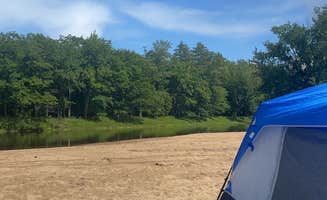
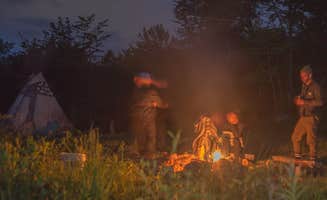
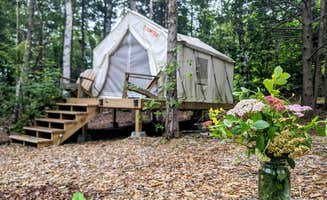
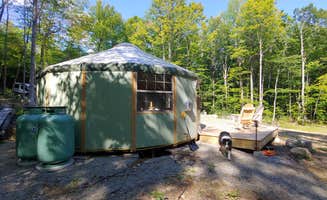
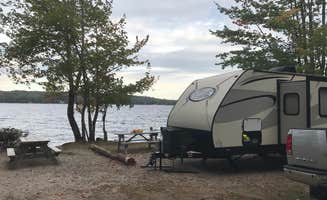
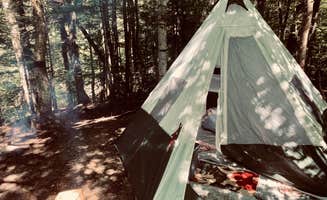
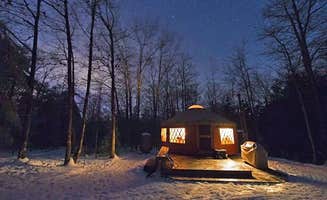

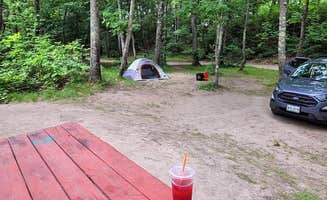
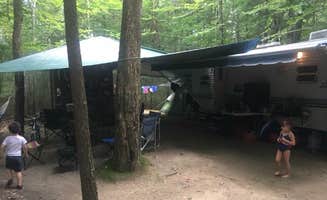
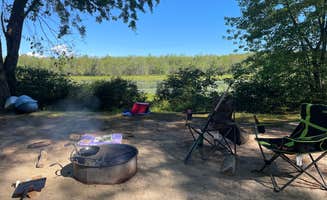
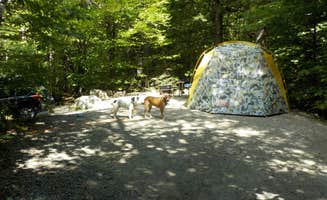
My family and I stayed in cabin 1 and had a direct view on top of the Pemi river. On site managers were very helpful. Will be back!
This is a great campground to be a seasonal at! 1 mile from a beautiful beach on Lake Winnipesaukee. 1 mile from town with cute shops and nice restaurants. Friendly staff. Seasonals are very friendly and welcome new seasonals. Campground is taken care of. It is family owned and they really care. I love the fact it is all seasonal- it has a wonderful community feel.
I was looking for a peaceful camping spot not far off the beaten path. This spot fits the description well.
This cpground is full of seasonal sp no transient sites. Has good owners who keep the park clean and well maintained. Very friendly campground.
Pros: Cleanliness, spacious sites, location,
Cons: will change your site for no reason, I booked site 43 and 44 they ended up giving my site 43 to someone else when they could have accommodated them at another site (mind you 3 more sites were available that day) - I actually paid for my site, I just feel like it’s a total crooked way of charging people and upon arrival your desperate to set up and they just threw this info at me stating that they changed my site. So disrespectful and rude and they don’t refund!
They charge extra for “lock in” site, not worth the money or the headache, they need better management. Showers are near the entrance (very long walk) or you’ll have to drive to the bathroom
Beautiful campground. Large secluded sites. Forested. Beautiful fall colors. Coin operated showers. Access to nearby trails.
Fairly extensive camp ground associated with Gunstock ski area on central New Hampshire. We arrived without a reservation a bit after the office closed, but Elena, the manager came out to let us in and allowed us to check in. She was great. Dogs must have proof of rabies vaccine. Very nice showers. Beautiful fall colors.
The place so nice and cleaned,quite also close to you must see and things to do. The price reasonable too. Highly recommended
We had a beautiful waterfront site, 10 minutes from downtown Freeport. The campground is a working farm that would be great for the kids. We will definitely be back.806
The White Mountain National Forest surrounding Lovell, Maine offers camping elevations ranging from 400 to 1,200 feet, with temperature variations often 10-15 degrees cooler than coastal regions. Summer nights typically drop to 50-60°F even when daytime temperatures reach the 80s. Most primitive camping areas near Lovell require visitors to pack out all trash and bring water treatment methods as potable water isn't available.
Hiking trails: Access several trails directly from Basin Campground, where "There are many wonderful hiking trails and next to lovely Basin Pond. So quiet!" Several trails lead to the Wild River Wilderness, with moderate elevation gains of 500-1,000 feet over 2-3 miles.
River recreation: Float the Saco River at Eastern Slope Camping Area, which provides tube rentals and river access. "This campground was really nice. Sites were large and level. Many large trees created a lot of shade... The river was awesome," shares one camper. River depth varies from 2-5 feet during summer, with gentle currents perfect for beginners.
Wildlife observation: Early mornings at Lakeside Pines Campground offer opportunities to spot loons, osprey, and occasionally moose. "Loons loons everywhere. Lots of wildlife," notes a camper. Bring binoculars for best viewing, particularly at dawn and dusk when wildlife is most active.
Riverside sites: At Town Hall Road Dispersed, campers appreciate the natural setting. "We drove down the road a bit, past a few tent sites just off the road. About the fifth one or so, you pull in and the fire pit is right there. Then walk down a bit and there's a large group site with another pit." Free sites are available first-come, first-served.
Privacy between sites: Many visitors value separation between campsites. "Each site offers a picnic table, fire ring, and access to the pond. The pit toilet bathrooms were clean and centrally located in the campground," reports a visitor to Crocker Pond. Most sites at established campgrounds offer 20-50 feet of separation through natural vegetation.
Weather resilience: Some areas handle precipitation better than others. "It was a great place for Rainy Camping. We went during a pouring rain storm and our site remained relatively dry. We even enjoyed a small fire the next day," explains a Town Hall Road camper. Sites on higher ground with good drainage remain usable even after significant rainfall.
Bear activity: Wildlife encounters require proper precautions. At Jellystone Park™ Glen Ellis, "We spent 5 days and wished it was longer. The campground was clean, staff was wonderful and the amenities were great! There were 2 active bears while we were there. They circled our camper at night." Store food in vehicles or bear-proof containers.
Seasonal considerations: Most campgrounds operate between mid-May and mid-October, with peak season in July and August. Weekends in summer often fill completely, especially at waterfront sites. One camper noted at Lakeside Pines, "Woodside and lakeside sites," are available, but waterfront locations book months in advance.
Frequently Asked Questions
What amenities are available at campsites around Lovell?
Campsites around Lovell range from basic to full-service facilities. Desert of Maine Campground offers free showers, washer and dryer facilities, and WiFi throughout the property. Sites are well-maintained with varying levels of privacy. Timberland Campground features beautiful walking paths along a river. Many area campgrounds provide clean restrooms, potable water, and picnic tables. Some locations offer riverside sites perfect for swimming or floating. Private campgrounds typically include more amenities like electric hookups and dump stations for RVs, while public sites may be more rustic with vault toilets and no hookups. Availability of specific amenities varies by location, so checking with individual campgrounds before arrival is recommended.
When is the best season for camping in the Lovell area?
The prime camping season around Lovell runs from late spring through early fall. Grafton Notch Campground operates from mid-May through Columbus Day, representing the typical season for many campgrounds in the region. Lafayette Place Campground is particularly popular during July and August when hiking conditions are optimal. Summer offers warm days perfect for swimming and river activities, while early fall brings stunning foliage. Spring camping (May-June) provides fewer crowds but potentially more variable weather. Some campgrounds close entirely during winter months, while others may offer limited services. Weather in the shoulder seasons can be unpredictable, so proper gear and preparation are essential if camping in May or after September.
Where can I find camping near Lovell, Wyoming?
Lovell, Wyoming offers several excellent camping options in the surrounding area. Town Hall Road Dispersed provides free camping opportunities with drive-in and walk-in access for those seeking a more primitive experience. For campers looking for established facilities, Crocker Pond offers beautiful sites along the water's edge, allowing stays up to 14 days. The area around Lovell features both public and private campgrounds within a short drive, giving visitors access to the region's natural beauty, hiking trails, and outdoor recreation opportunities. Many campgrounds in the vicinity require reservations, especially during peak season, so it's advisable to plan ahead.
Keep Exploring